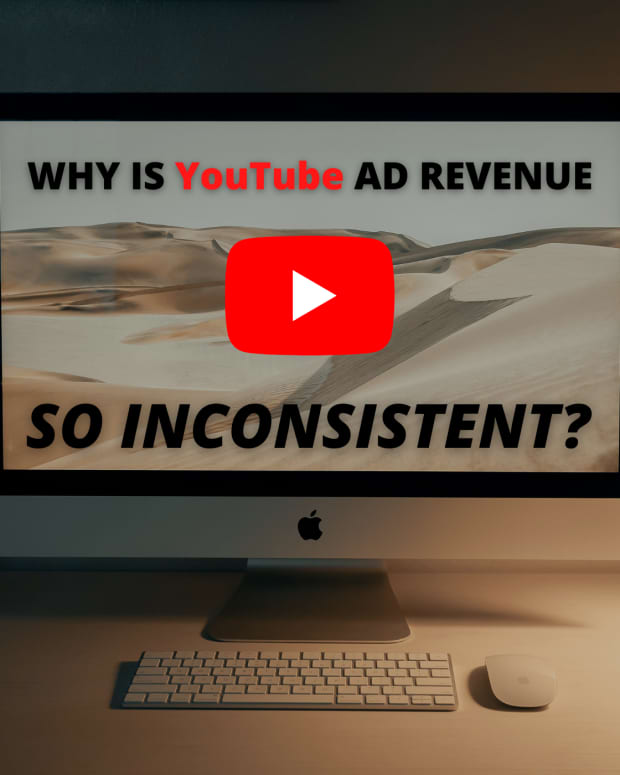How to Earn Money Online as a Copywriter
John is a fervent writer, gamer, and guitar lover. Former automatic-transmission repairer, welder and hobbyist game developer.
Not every person earning money online is a millionaire entrepreneur or an insanely famous YouTuber; many just work quietly, earning a modest living from the comfort of their own home, performing various work for their clients.
The advantages to this kind of life are obvious; working on your own timetable, making as much or as little as you’re prepared to work for, not having to worry about a commute… all the things that get pitched to you by online marketing scams. The difference between those scams andworkingonline is that you can actually earn money by working for it. Copywriting is one such method of earning an income online without relying on schemes or business plans or going viral on YouTube.
What Is Copywriting?
Copywriting is the act of writing “copy” for a client, either for online or print media. The purpose of this copy is nearly always marketing and promotional, and can range from an “About Us” page for a company’s website, through to an outright sales pitch for a product or service.
There are a few necessary skills you will need to make any kind of respectable income from copywriting;
- Language Competency
- Appropriate Tone
- Working Knowledge of SEO
Language competency is simply the ability to write fluently in the language your client requires. If English is your only language there’s no sense in taking on a German copywriting gig.
While you can make a respectable amount copywriting in only one language, tone is a different matter. You will soon find that various copywriting jobs require different tones in their copy such as casual, formal, technical, and more. Being unable to switch between these tones will severely limit the number of jobs you can take.
And, finally, SEO (Search Engine Optimisation) is the dark art of writing content that is “search engine friendly”, a subject that is ever changing and deserves a hub of its own. Needless to say there is plenty of information online about this. Or, if you prefer a more curated approach, try Adam Clarke's ludicrously long-titledSEO 2016 Learn Search Engine Optimizationwith Smart Internet Marketing Strategies...
How to Get Copywriting Work
In the old days of the Internet you would find copywriting work the same way you would find any work as a self-employed entity; you would advertise your services and pitch clients, almost certainly requiring you to set up a website and hope people view it. Fortunately, among the many advances there have been in online money earning opportunities, many more ways to get copywriting work have emerged.
Content Mills
Pros:
- No pitching for jobs
- Work as and when you want it
- Mostly small, manageable jobs
Cons:
- Competitive; first come, first serve
- Not always jobs available
- Lower paying rates
“Content Mill” is a bit of a dirty term among copywriters. A content mill is a company (usually entirely online) that “hires” writers to complete writing tasks for their clients. Content mills are attractive to clients because their prices are much lower than a typical copywriting firm or individual, and they’re attractive to copywriters because it removes the need to make sales pitches in order to get work.
Generally speaking, you (the copywriter) will sign up to a content mill site where there will usually be some kind of assessment to make sure you are up to the task. Many sites will accept pretty much everyone but grade them based on their ability with lower grades limiting you to lower paying jobs.
From then on in it’s a free for all. The content mill goes off and finds jobs, typically getting orders along the lines of “500 product descriptions for our range of interior lighting”, which they will then post on the website. Copywriters like you then sign in to the website and see 500 new jobs available, each one being a single product description. It’s literally first come, first serve, and there are usually limits on how many jobs you can take on at once, meaning you’ll have to finish some before you can take more.
There are many content mills out there but the two I will mention are文本brokerandGreatcontentfor the simple reason that I have used both, been paid by both, and can vouch for their legitimacy. If you intend to make a respectable income from content mills alone, however, you’ll need to sign up to multiple services and check with them regularly. The first come, first serve nature of the assignments on offer mean that these services can go for days or weeks at a time without any assignments available, so it’s best not to rely on only one.
Freelancing Platforms
Pros:
- Potentially higher rates of pay
- Work as and when you want
- Jobs of all sizes available
- Nearly always work available
Cons:
- Must pitch for work
- Usually costs to get all features of service
Freelancing platforms are a middle ground between content mills and being completely freelance yourself. In a similar fashion to content mills, you sign up as a freelancer to provide a service, while clients sign up to request services. You can then browse those requests and, when you find one you like, make a pitch for it.
A pitch generally involves first convincing the potential client that you are capable of the task—something that gets easier if you build up a history of good feedback—then convincing them that you are right for this particular job and can deliver by their deadline, and finally, giving them a price that they are willing to pay for the work.
Pricing your job is a tricky prospect. Freelancing platforms firmly occupy the middle ground in copywriting rates of pay. Clients looking for the cheapest possible rate will tend to go to content mills, while clients wanting the best possible service regardless of cost will seek out respected copywriters or firms. Thus, if you price yourself too low the client will likely assume your quality of work will not be up to the task. Similarly, if you price yourself too high, the client simply won’t want to pay that amount.
与内容工厂一样,有许多自由职业者platforms out there. And, as with the content mills section, I’ll only name the one that I have used and can say with confidence that it works as advertised and pays out as promised, and that isUpwork, though it was called eLance when I used it.
的主要优势在反对自由的平台tent mills is the fact that you can pitch for, and hopefully get, far higher paying work that you could with a content mill. You can also get jobs of much larger scope, which may not be a far greater rate of pay than content mills, but offer a greater amount of security over earning small sums and not being sure when another batch of assignments will go up.
Freelance platforms typically work on a Basic/Premium model, whereby you can sign up and use the service for free with some features missing. Upwork, for example, uses a points system where each pitch costs you points. Going premium not only gets you more points, but it also allows you to see what other’s are bidding so that you can make an informed choice when pricing the job yourself.
Going Freelance
Pros:
- Potential for far greater earnings
- Work as and when you want
- Not limited to one job list
Cons:
- Finding work is entirely down to you
- Must invest time/money to get started
If you decide to go entirely freelance, you have the potential to make far bigger earnings than either of the two above methods, but you will have to work much harder to get those earnings.
For one thing, you will be relying on your own marketing ability to get work. There will be no content mill or freelance platform pulling in the jobs for you to snatch up, you’ll need to do that yourself. A good sales pitch won’t suffice in this respect; you’ll need a decent body of work that a potential client can look at and decide if they think you’re up the task, and this makes getting started this way far more difficult as you need to have some writing work out there in order to get more writing work. Consider writing blog posts (if you don't already) or submitting articles to media outlets until you’ve built up a decent portfolio, and always check with previous clients before using work you’ve done for them in your portfolio.
You’ll need a website (unless you’re a marketing magician) and you’ll need to get your name out there, which likely means promotion of some kind. In short, getting started on your own as a copywriter will take a bit of financial investment, as well as time.
On the other hand, as discussed above, the people who want cheap go for content mills, and the people who want the best go for independent copywriters and copywriting firms with a good reputation, so if you can build up that reputation, you will start to see work coming to you, and it will pay orders of magnitude better than anything you’ll find in a content mill, and even a freelance platform 90% of the time.
Pointers
It’s important to properly value your time. If it’s taking you an hour to complete a job for which you’re only being paid $5, maybe it’s not worth it to you. On the other hand, earning $5 for that hour when you would otherwise have been earning nothing at all may be enough of a draw. You’ll have to judge your own situation accordingly.
Doing repetitive copywriting jobs can be a bit mind numbing, but it’s important not to let your quality of work drop. Negative ratings on any of the above platforms, or with clients in general, will soon see you unable to get work at all.
Beware of clients who don't value your work. If a client is constantly trying to get the price down, or if they want to paywaybelow the market average for a job, take my advice and walk away. In every industry I've worked in, it's the customers/clients that try the hardest to get the price as low as possible that are the most demanding. You may (as I have) accept a low paying job just to get some cash in, or to build up your portfolio, only to find the client being a nuisance with unreasonable edit requests long after the job is done. It's not worth it.
Above all, try to enjoy it. If writing is not something you find fun or easy, you'll struggle in the copywriting world. Fortunately, in the age of the Internet, you can give it a try for free!
This article is accurate and true to the best of the author’s knowledge. Content is for informational or entertainment purposes only and does not substitute for personal counsel or professional advice in business, financial, legal, or technical matters.
© 2016 John Bullock
Comments
Waqason August 02, 2020:
Send me job
Asadon August 01, 2020:
I Mudasir Aslam wants to be the kind person in the world so that's why I chose to be good in typing master
Jason B Truthfrom United States of America on July 01, 2019:
Interesting article. I'll look into this opportunity.
deloar hosenon June 25, 2019:
i need work i am is a best b=copy writing
Katy Preenfrom Manchester, UK on April 29, 2017:
This is genuinely useful info for me, as I'm just starting out freelancing. I can see my plan being to start off with the content mills and freelancer sites, working towards being completely independent. But I'd probably keep some of the smaller stuff on the back burner, in case things don't work out exactly as planned.
Olivia Holmesfrom Texas on October 18, 2016:
Now a days, copy writers have more demand in the market and they earn like anything.


















